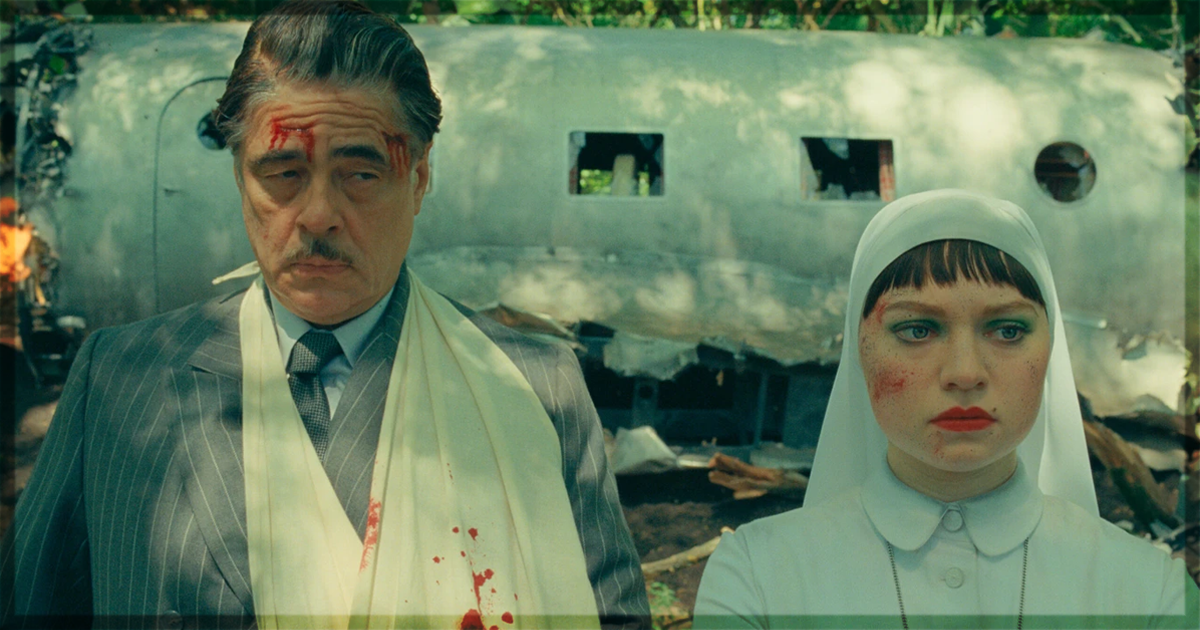Everybody knows the greatest thing about Wes Anderson’s movies is their sense of style. Style is the tool he uses to bring lightness to dark and complex subjects such as grief, the creeping threat of fascism and being an insufferable young person. The staging and blocking, the centering of images, the fonts and anachronistic use of models are all present and correct here too. But tools can be the subtlest of traps, and it’s clear that in The Phoenician Scheme, for the first time, his style has taken over.
Zsa-Zsa Korda (Benicio del Toro) is a hated wealthy warmonger and the subject of continual assassination attempts. In the film’s opening shot one of his assistants is blown in half by a bomb on a plane, which crashes. As that is the sixth plane crash Zsa-Zsa has been in, he doesn’t worry. In the aftermath, a new assistant, Bjorn (Michael Cera), is hired, and Zsa-Zsa calls his only adult child home. This is Liesl (Mia Threapleton, more on whom later), who smokes a pipe and hasn’t seen her father in years and is less than a month away from taking holy orders. This religious vocation of hers is inconvenient, as Zsa-Zsa plans to hand over his entire evil business and its fortune to her, and wants her to join his upcoming business trip to learn the ropes.
He is attempting to finance a scheme in the nation of Phoenicia, the exact details of which don’t much matter but do require slave labor to be affordable. To raise the financing Zsa-Zsa and Liesl, with Bjorn in attendance, must have various meetings with various potential funders, including: Tom Hanks and Bryan Cranston as basketball-loving businessmen brothers, Riz Ahmed as a prince, Mathieu Amalric as a guy in a fez, Richard Ayoade as a guy in a beret, Scarlett Johansson as a lady who is building a dam, Jeffrey Wright as a guy in a captain’s hat, and Benedict Cumberbatch as the guy playing the kind of part you’d imagine Benedict Cumberbatch to play in the midst of all this silliness. There’s also an international committee specifically to stop Zsa-Zsa, headed by Rupert Friend. Hand grenades are passed out like party favours, Liesl’s unimportant nine younger brothers pose around the scenery, and the man who has profited off the pain and the deaths of countless others begins wondering what it was all for.
It is perhaps a slight change to have a bad man mending his wicked ways for a daughter instead of a love interest, but that does nothing to alter the sexism inherent in the concept. Ms. Threapleton, who does not get an introducing credit despite this being her first movie role, unfortunately is not quite up to conveying why a woman prepared to reject the entire world because of the evil her father has done in it decides to give him a second chance. At least when Cindy-Lou Who took on the responsibility of growing the Grinch’s heart she was no more than two. Liesl meanwhile is old enough to know better and surprisingly willing to forgive the man who she believes is responsible for the death of her mother, nun or not. On the other hand, the young actress playing Young Liesl, Beatrice Campbell, does an extraordinary job with a hallucinated monologue where she speaks directly to Bill Murray, I mean God, I mean Bill Murray playing God (and what a piece of casting that is). On the other other hand not even Ms. Threapleton’s mother, Kate Winslet, might have been able to find the nugget of truth in a role so transparently designed to make an evil murderer lovable.
As always with a Mr. Anderson movie, the sets are to die for, the costumes are delicious, the staging is perfection and it all ties up with a very neat little bow. Mr. del Toro has damped down his unpredictable charisma here to be the rock on which the rest of the movie stands, and all the men listed above, most especially Mr. Cera, have a great time prancing around being silly. But for a movie which begins with someone literally blown apart, there’s just too much prancing around being silly and not enough genuine anything. The stakes aren’t high enough, the plot is just one damn thing after another, and the ending doesn’t satisfy. It’s very enjoyable while it’s happening, as are all of Mr. Anderson’s movies, but this is the first one where there is no substance under the style, meaning the style doesn’t hold up. It’s the first misfire on Mr. Anderson’s resume.
It is also, if I am not mistaken, the first time Mr. Anderson has allowed real-world product placement in his movies. For many people, no doubt including the American chocolate company who probably provided a financial incentive for their product to appear, the style is more than enough. When I reviewed Asteroid City two years ago, also at the Cannes Film Festival, I worried that his style has flown as far as it could and predicted that Mr. Anderson’s next movie would be the turning point of his career. So now that we have seen the turning point, the next one will determine how right I was.
The Phoenician Scheme recently played at the Cannes Film Festival.
Learn more about the film, including how to buy tickets, at the official website.


